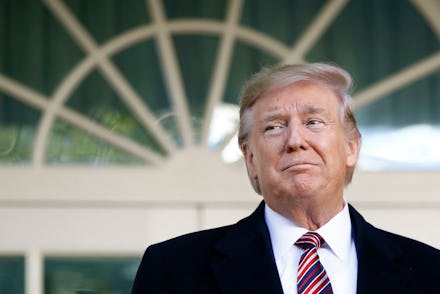Supreme Court temporarily gives Trump a win on his tax records

President Trump's finances have been a cause for concern since his election, as his career as a businessman prior to his presidency opens up potential for conflicts of interest. House Democrats believe financial documents may offer clarity, but on Monday, the Supreme Court shielded Trump's financial records from Congress. Although the ruling is a temporary block, it could set the stage for yet another battle.
Legal battles over Trump's tax return involve multiple parties, including the House Committee on Oversight and Government Reform. In May, that committee subpoenaed Mazars USA, an accounting firm, for eight years of Trump's tax records.
Trump's lawyers tried arguing that the House committee had no legislative purpose for their request, and thus that there was no need to cooperate with the subpoena. However, the House Oversight Committee's request was backed by an October District of Columbia Court of Appeals ruling, which said Mazars needed to turn over those records. Earlier this month, the court declined to revisit their decision, which prompted the Supreme Court's involvement.
In a one-paragraph order, the Supreme Court paused the lower court's ruling. However, this is only a temporary decision. Trump's lawyers have until Dec. 5 to file a formal petition asking that the Supreme Court hears the case. If they don't, then the order will no longer be in effect and the subpoenas will have to be answered.
It's likely that Trump's lawyers will comply with the Supreme Court's ruling, Politico reported, which means the dispute could be heard this spring and resolved by June. The House Oversight Committee isn't the only body currently seeking Trump's tax returns, though.
There's also the House Ways and Means Committee, which subpoenaed Treasury Secretary Steven Mnuchin and IRS chief Charles Rettig for over six years of records. In May, Mnuchin and Rettig defied those subpoenas, which was to be expected. Mnuchin wrote a letter to the committee's chairman, Rep. Richard Neal (D-Mass), claiming the request "lacks a legitimate legislative purpose."
There's interest in Trump's financial records outside of the House as well. In May, Trump's former personal lawyer, Michael Cohen, testified before Congress (with receipts) that the Trump Organization paid him $350,000 as reimbursement for paying off women who alleged they had extramarital affairs with Trump, claims the president has denied.
"These include a copy of a check Mr. Trump wrote from his personal bank account, after he became president, to reimburse me for the hush money payments I made to cover up his affair with an adult film star and to prevent damage to his campaign," Cohen told Congress about the records he had.
As a result of these statements, Manhattan District Attorney Cyrus Vance Jr. also subpoenaed to obtain records from Mazars. In October, a federal judge ruled that Trump needed to hand over eight years of records, but he was quickly granted a temporary stay.
Trump seems to believe he is the only president whose financial records have ever been a concern. In October, Trump tweeted, "The Radical Left Democrats have failed on all fronts, so now they are pushing local New York City and State Democrat prosecutors to go get President Trump. A thing like this has never happened to any president before. Not even close!"
The fact is, most presidents have been open with their tax records, so nobody needed to go to extreme lengths to access them. Between 1974 and 2012, every president but Gerald Ford authorized a voluntary release of the tax returns they filed while in office, according to TaxNotes. Even Ford put together 10 years of summary data that included gross income, taxes paid, and more.
With court battles mounting, there are other reports that point at issues with Trump's finances. Last week, records revealed that Secret Service spent over $250,000 at Trump's properties in the first five months of his presidency, and Democrats are investigating an allegation that numerous groups, including one foreign government, booked rooms at the Trump International Hotel in Washington, D.C, to gain the president's favor.
Trump may be willing to take this issue up with the Supreme Court. If the case is taken on by the justices, it's essentially a showdown between two branches of government that will influence presidencies — and the power that the House has — forever.